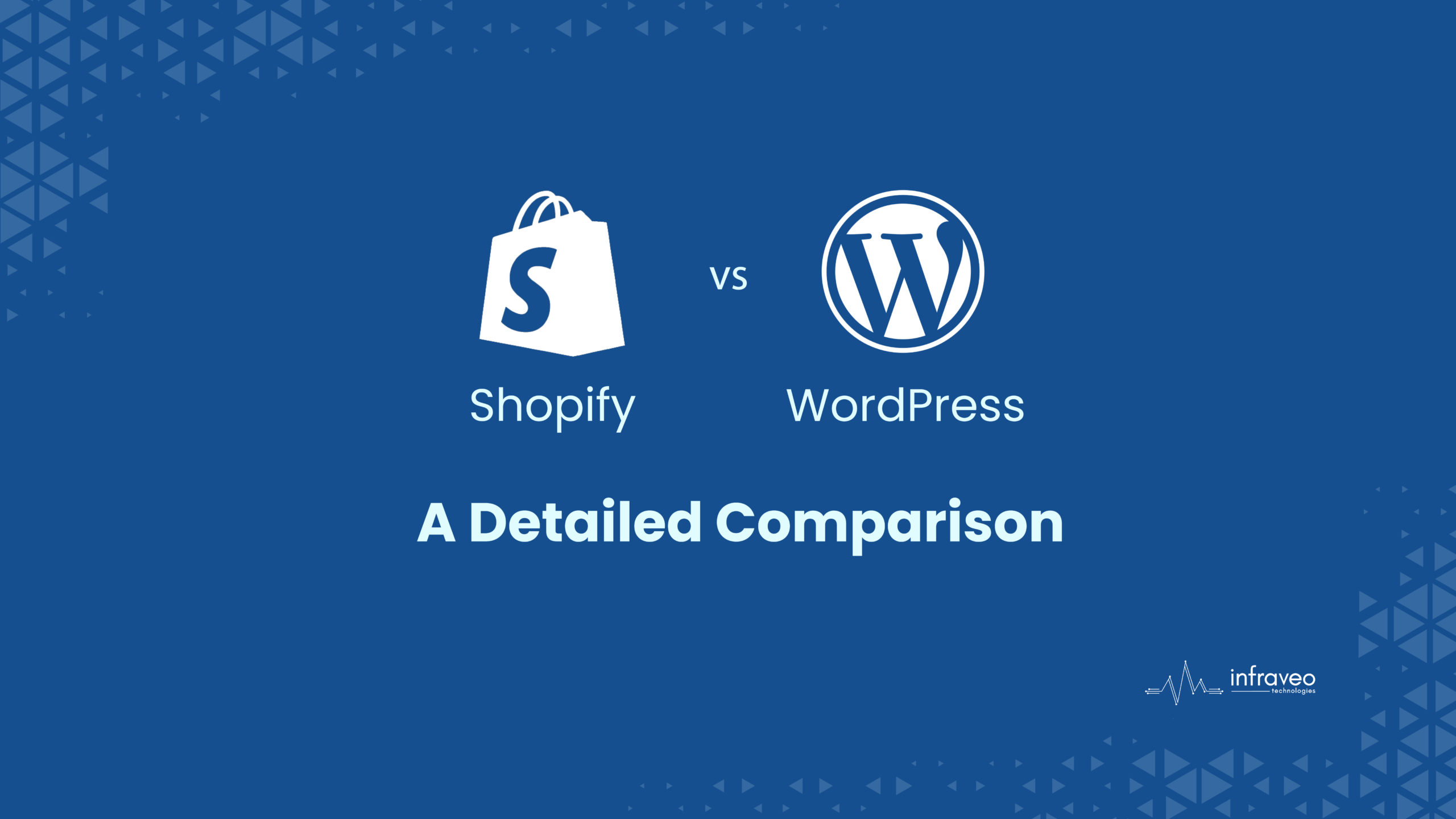The demand for e-commerce stores is rising at a rapid pace. So, if you are here, there is a high chance that you have already thought of building your eCommerce store. The digital wave has left no stone untouched. When there is an option of selling goods online, which vendor would prefer investing in expensive real estate? But countless vendors are in a dilemma of choosing Shopify and WordPress. Both platforms hold a reputation for being sale-friendly sites in the world of e-commerce. Along with being convenient and adaptable, both platforms offer exceptional performance. This blog will tackle the question: Shopify v/s WordPress: Which is better? In-depth.
Overview of Shopify and WordPress
Shopify is a popular web platform that allows you to create an e-shop without the requirement of prior code knowledge or design skills. However, that does not mean that if you have the same, it is all in vain. It allows you to choose from a large section of themes that you can alter as per your liking and preferences.
WordPress is another fantastic website platform. You throw anything at it, and it will cope up very easily. Using this web platform, you can make your website easily accessible and available for viewing by everyone. Unlike Shopify, it is available in two different versions, namely WordPress.org(self-hosted) and WordPress.com (hosting service). The main difference between these two versions is that wordpress.com allows you to create a website using the WordPress software, whereas wordpress.org gives you complete control over your website. In other words, you and your hosting company are accountable for a WordPress installation.
This overview clarifies that Shopify and WordPress are titans in the web design industry. But that is not it. There are a lot of things that require attention when comparing WordPress and Shopify.
Let us dive deep into the comparison based on numerous factors.
Ease of Use
Talking about Shopify, it is easy to install, set up, and sell. You do not need to be an expert in-store development to launch an online retail store using Shopify. Its dashboard is simple and allows you to view orders and customers’ data, add, delete and modify data, and design your website. You can access the backend and front end of your store in one place.
On the other hand, WordPress use cases range from the launching of portals, landing pages, company websites, and blogs to portals that require user registration. Like Shopify, its dashboard is simple and has a clean user interface. The backend of WordPress has various content areas and settings that are subject to change, listed on the left side. Therefore, it is safe to say that the backend is uncluttered.
Final Verdict
Both platforms have a clearly instructed dashboard. Hence, users can choose any of the platforms to build their website on if they want the ease of use.
Pricing
The cost plays a crucial role in deciding the software for any business.
Shopify offers four plans. They are Basic Shopify (29$ per month), Shopify (79$ per month), Advanced Shopify (299$ per month), and Shopify Plus (2000$ per month). Though the price range is quite affordable to build an e-commerce website, it is advisable to have a closer look at the features that come with the plan and choose the one that aligns best with your business goal. Let us not forget to mention that if you do not use Shopify payments, you will be charged an additional transactional fee in addition to the payment processor fee (PayPal or Stripe). The cost per transaction is usually around 2% for the Basic Shopify plan, 1% for the Shopify plan, and 0.5% for the Advanced Shopify plan.
However, it is uncertain to predict the accurate cost of developing a website using WordPress because several factors are at play. The cost will depend on themes and design selected, the price of hosting, the requirements of plugins, fees charged by a developer as WordPress requires a basic knowledge of coding, etc. But the estimated price of building a website using WordPress includes $350 per year for the annual hosting, $150 for a premium theme, $180 per year for e-commerce integrations, $100 for plugins, and $500-2000 for developer’s guidance.
Have a look at the following table that shows a brief comparison between Shopify and WordPress in a structured manner
Basis | Shopify | WordPress |
| Cost | Three pricing plans: Basic Shopify, Shopify, Advanced Shopify, and Shopify Plus, ranging from $29 to $2000 per month | Free to download and install (if your website is already built on WordPress) |
| Products | Provides 80+ free and paid themes | Provides over 4,000 templates to download |
| Hosting | Included in the monthly payment | Not included |
| Transaction fees | Charges a transaction fee on each order for each product | No such fees are charged |
| Bandwidth charges | No charges | Depends upon the hosting provider |
Final Verdict
A small and medium-sized business can consider Shopify to build an e-commerce website. But a large corporation that requires more control and flexibility should use WordPress as it allows customization.
E-Commerce Features
Shopify is designed solely to set up e-commerce stores. Therefore, it has a lot of in-built e-commerce tools. WordPress, on the other hand, was not designed specifically for creating e-commerce stores. It requires a lot of intermediary plugins to launch an online store on WordPress. One of the most popular WordPress eCommerce plugins is WooCommerce. It comes with all the required features to set up an e-commerce store.
Final Verdict
If simplicity is your goal, then it is better to stick with Shopify because, no doubt, WordPress offers extra functions, but for an e-commerce site, those are not required. WordPress is a better site builder, but Shopify is a superior e-commerce platform.
Theme Design and Customizability
Shopify has 71 professionally designed themes that you can choose and edit, even if you are from a non-technical background.
WordPress has a truckload of modern and classy themes, but not all of them are suitable for an e-commerce website.
Final Verdict
Shopify and WordPress have free and premium themes. You can choose from either. But if you are looking for a customizable website, then WordPress is the winner.
Customer Support and Guidance
We mostly overlook this factor. It is a general tendency to think that I will learn about the system or software over time. However, it is always a safe choice to ensure that help is available if stuck.
Shopify offers amazing customer support. Every plan includes standard customer guidance, either in the form of email or phone.
In the case of WordPress, it does not offer a lot of customer support. Customer guidance is available in the form of WordPress forums. Therefore, you will need a developer who specializes in WordPress to avail yourself of a more comprehensive type of support.
Final Verdict
We have a clear hand winner in the battle of Shopify v/s WordPress in terms of support and maintenance i.e., Shopify. If you have already built your website on WordPress, then a vendor with a good history of customer guidance can help you with your issue.
When is Shopify preferable over WordPress?
In the following scenarios, you can choose Shopify as your website platform:
- A person with a non-technical background who wants to build an e-commerce platform immediately.
- If you are looking for an affordable option to increase your online presence.
- If you are looking for a platform that offers great customer guidance.
When is WordPress preferable over Shopify?
You can use WordPress if you:
- are already familiar with the UI of WordPress.
- already own a WordPress website and want to cut down on the cost of investing in a new e-commerce platform.
- hold a sound knowledge of coding.
To Sum Up
If you already have a website built on WordPress, then install WooCommerce and launch an e-commerce store as an element of the existing website because it will save you time and money.
But if you are new to the web industry, then build your e-commerce website on Shopify. It is an easier and quicker option.




